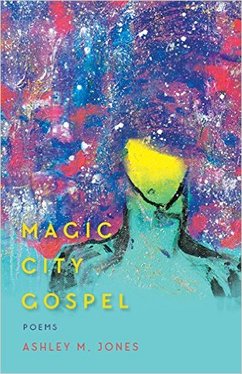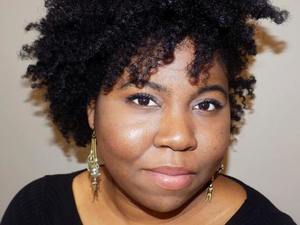Magic City Gospel by Ashley M. Jones

Paperback: 77 pages
Publisher: Hub City Press (2017)
Purchase: @ Hub City Press
Review by Len Lawson
With Magic City Gospel, Ashley M. Jones welcomes readers to Alabama, a hotbed for racial tension, to introduce family and history. She achieves magic by conjuring smoke from the state’s Jim Crow past and mirrors which she herself stands in front of.
It is the heat in this heart of Dixie that serves as Jones’ backdrop for discussions on controversial issues. In “De Soto, Discoverer”, Jones writes on the origins of Alabama in the voice of European settlers who proclaim, “Even the blistering sunset / knows our names-- / it whispers / as it curtsies, equatorially / Espana, manifesto / the world is yours.” In “God Speaks to Alabama”, she writes in the voice of God to call the state back to Himself, acknowledging the climate: “I have waited / in this heat for you / to pucker / and say my name-- / Hallelujah Alabama.”
The heat is also a marvelous motif to merge Jones’ childhood and the history of racism in the state. In “Birmingham Fire and Rescue”, she remembers visiting her father’s fire station and playing with the water hose with her family. She describes the hose as “a shower of mist and light / to cool us / in the Alabama heat.” The flashback reminds her of more innocent days where a water hose was a play thing and not a weapon for segregation. In “Birmingham Fire and Rescue Haiku, 1963”, Jones shows that the water hose ironically adds more fuel to fires of racism in Alabama rather than extinguishing them. “What about us said / we were on fire? What said / extinguish quickly, // fill up the hose / and set the dogs loose?...”
A water hose would also have been used to quench the flames of the infamous 16th Street Birmingham Church Bombing. In “Addie, Carol, Cynthia, Denise”, Jones recalls this event that set Alabama and racial tension in the U.S. on fire. “Remember how 16th Street shook, / symphony of fiery coughs / that turned our Birmingham to blood.”
Jones not only writes about the country’s battle with racism from the past, but she also is conscious of its impact on the present. She writes a gorgeous elegy in “Sammy Davis Jr. Sings to Michael Brown” for the young man killed by policeman Darren Wilson in Ferguson, MO, in 2014. She recognizes how young black men are vilified in this nation through her poem “The Men Come for Emmit and Tamir and Michael and Eric and John and Trayvon and…” She asks, “What is a black boy but a villain? / His black eyes. The way he goes about his black business. His towering / black height. His slang-cluttered speech.”
Furthermore, woven in these accounts is the coming of age for a black girl in Alabama. In “Nem” (a common Southern colloquialism), Jones reveals in a pseudo-post-racial era how the shadow of racism looms heavy in the minds of children. “You’re quick with jokes / about race—you’re the only black girl in most of your classes. It is / easy to blend in and stand out.” In “The First Time I Heard about Slavery”, the young girl is mortified at the possibility that the racism and slavery depicted in Roots might actually come back alive in modern times. “So I didn’t sleep. I kept my eyes wide and guarded the life I had come to know.”
This collection is uniquely Alabama and uniquely Southern. Ashley M. Jones is not just a Southern writer. She is a writer for the present time who has carefully observed Alabama history and canonized it in the fabric of American history, blending her own childhood experiences into the complex American tapestry. She masters the first poetry collection by remaining transparent for readers despite growing up in a setting that has marginalized the existence of her demographic. Magic City Gospel truly is the good news of Jones’ ability to perform optical illusions with her poetry.
Publisher: Hub City Press (2017)
Purchase: @ Hub City Press
Review by Len Lawson
With Magic City Gospel, Ashley M. Jones welcomes readers to Alabama, a hotbed for racial tension, to introduce family and history. She achieves magic by conjuring smoke from the state’s Jim Crow past and mirrors which she herself stands in front of.
It is the heat in this heart of Dixie that serves as Jones’ backdrop for discussions on controversial issues. In “De Soto, Discoverer”, Jones writes on the origins of Alabama in the voice of European settlers who proclaim, “Even the blistering sunset / knows our names-- / it whispers / as it curtsies, equatorially / Espana, manifesto / the world is yours.” In “God Speaks to Alabama”, she writes in the voice of God to call the state back to Himself, acknowledging the climate: “I have waited / in this heat for you / to pucker / and say my name-- / Hallelujah Alabama.”
The heat is also a marvelous motif to merge Jones’ childhood and the history of racism in the state. In “Birmingham Fire and Rescue”, she remembers visiting her father’s fire station and playing with the water hose with her family. She describes the hose as “a shower of mist and light / to cool us / in the Alabama heat.” The flashback reminds her of more innocent days where a water hose was a play thing and not a weapon for segregation. In “Birmingham Fire and Rescue Haiku, 1963”, Jones shows that the water hose ironically adds more fuel to fires of racism in Alabama rather than extinguishing them. “What about us said / we were on fire? What said / extinguish quickly, // fill up the hose / and set the dogs loose?...”
A water hose would also have been used to quench the flames of the infamous 16th Street Birmingham Church Bombing. In “Addie, Carol, Cynthia, Denise”, Jones recalls this event that set Alabama and racial tension in the U.S. on fire. “Remember how 16th Street shook, / symphony of fiery coughs / that turned our Birmingham to blood.”
Jones not only writes about the country’s battle with racism from the past, but she also is conscious of its impact on the present. She writes a gorgeous elegy in “Sammy Davis Jr. Sings to Michael Brown” for the young man killed by policeman Darren Wilson in Ferguson, MO, in 2014. She recognizes how young black men are vilified in this nation through her poem “The Men Come for Emmit and Tamir and Michael and Eric and John and Trayvon and…” She asks, “What is a black boy but a villain? / His black eyes. The way he goes about his black business. His towering / black height. His slang-cluttered speech.”
Furthermore, woven in these accounts is the coming of age for a black girl in Alabama. In “Nem” (a common Southern colloquialism), Jones reveals in a pseudo-post-racial era how the shadow of racism looms heavy in the minds of children. “You’re quick with jokes / about race—you’re the only black girl in most of your classes. It is / easy to blend in and stand out.” In “The First Time I Heard about Slavery”, the young girl is mortified at the possibility that the racism and slavery depicted in Roots might actually come back alive in modern times. “So I didn’t sleep. I kept my eyes wide and guarded the life I had come to know.”
This collection is uniquely Alabama and uniquely Southern. Ashley M. Jones is not just a Southern writer. She is a writer for the present time who has carefully observed Alabama history and canonized it in the fabric of American history, blending her own childhood experiences into the complex American tapestry. She masters the first poetry collection by remaining transparent for readers despite growing up in a setting that has marginalized the existence of her demographic. Magic City Gospel truly is the good news of Jones’ ability to perform optical illusions with her poetry.

Ashley M. Jones received an MFA in Poetry from Florida International University (FIU), where she was a John S. and James L. Knight Foundation Fellow. Her poems appear or are forthcoming in the Academy of American Poets, Tupelo Quarterly, Prelude, Steel Toe Review, Fjords Review, Quiet Lunch, Poets Respond to Race Anthology, Night Owl, The Harvard Journal of African American Public Policy, pluck!, Valley Voices: New York School Edition, Fjords Review: Black American Edition, PMSPoemMemoirStory (where her work was nominated for a Pushcart Prize in 2016), Kinfolks Quarterly, Tough Times in America Anthology, and Lucid Moose Press’ Like a Girl: Perspectives on Femininity Anthology. She received a 2015 Rona Jaffe Foundation Writer’s Award and a 2015 B-Metro Magazine Fusion Award. Her debut poetry collection, Magic City Gospel, is forthcoming from Hub City Press in January 2017. She serves as an editor of PANK Magazine, and she currently lives in Birmingham, Alabama, where she is a faculty member in the Creative Writing Department of the Alabama School of Fine Arts.
